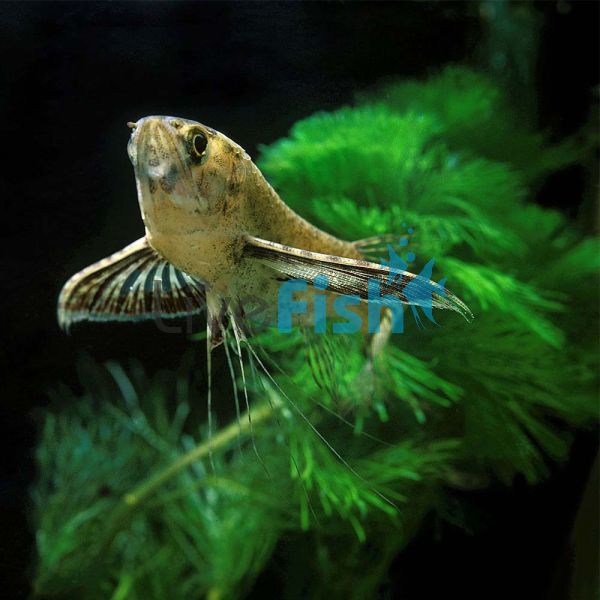Butterfly Fish 4.5cm
The Butterfly Fish has to be the mascot of oddball aquarium fish, a close relative of the Arowana, and a species that is better reserved for experienced aquarists, this is a must-have species for aquarists sharing a small and unique species. These fish look more alien than they do fish and only reach a maximum size of 15 cm, making them great fish for smaller aquariums. Their slow and sensitive nature doesn’t make them great for active community tanks but these mini predators would be perfect in a species-only biotope system.
Butterfly Fish
The Butterfly Fish has to be the mascot of oddball aquarium fish, a close relative of the Arowana, and a species that is better reserved for experienced aquarists, this is a must-have species for aquarists sharing a small and unique species. These fish look more alien than they do fish and only reach a maximum size of 15 cm, making them great fish for smaller aquariums. Their slow and sensitive nature doesn’t make them great for active community tanks but these mini predators would be perfect in a species-only biotope system.
Butterfly Fish get their name due to the unique display of fins they have. Especially when looking at them from above, the butterfly-style pectoral fins are a real sight to see. These fish are also masters of camouflage, in a black water aquarium or even a planted aquarium, these fish will at times be invisible because they have a camp body colour and move very little through the day. The body colouration is a pale brown with an array of peppering that varies in shades of brown. A faded black line runs horizontally through the eye and a darker brown stripe runs along the lateral line. The fins of the butterfly fish will have plant root-like extensions which really make these fish look like a bit of decaying plant matter floating in the water. Butterfly fish also have surprisingly large trap jaw-like mouths which are seen in other bony tongue species, this is why this species is often known as a mini Arowana.
Butterfly Fish are not regularly bred in the home aquarium but it is possible. Much like Arowana these are mouthbrooding fish where the female will lay eggs that the male will pick up in their mouth. From here the male will incubate the fry in his mouth until they hatch, after this, the male will spit out fully formed fry. Properly breeding them requires specific triggers such as a dedicated environment, changing the water level, feeding live foods, and manipulating the temperature. The wild origin of the Butterflyfish is Africa.
Tank Recommendations for your Butterfly Fish
Butterfly fish get fairly large at 15cm, so the bare minimum aquarium would be around 75 liters. These fish do not move around too much and come from quite slow-moving water, which is why flow is important. The most ideal method of filtration would be an air-driven sponge filter or a low-flow canister filter. Replicating a vegetation-dense environment will really make these fish comfortable along with the use of botanicals and driftwood. These are fish that spend all their time near the top portion of the aquarium which is why a tight-fitting lid is a must.
Suitable Tank Buddies
The butterfly fish is peaceful but they are also a micro predator. They will easily eat any fish that can fit in their mouth and are opportunistic feeders. They are however really slow and shy fish that can easily be outcompeted by a lot of other fish. Any fin-nipping species should also be avoided as they will make short work of the butterfly fish fins.
Usually Compatible
Corydoras, Elephant nose, Plecos, Bolivian Rams, and other peaceful bottom-dwelling fish species.
Sometimes Compatible
Gourami, mollies, Apistogramma, and potentially territorial or fast-moving fish can outcompete the butterfly fish.
Rarely Compatible
Aggressive species may prey on the butterfly fish or any fin-nipping species such as tiger barbs which could cause constant injuries to the fish.
Feeding your Butterfly Fish
One of the main challenges when keeping African butterfly fish is getting them to feed. These fish may never take too pellets or flakes as they are mostly insectivores. Part of the fun is throwing crickets onto the surface of the water just to watch these fish slowly stalk and hunt them. They may also take too black, blood, and earthworms which can be an easier feeding method. In very rare situations, they may take to protein-rich floating pellets once they associate the scent with food. Having multiple butterfly fish can also trigger a better feeding response.
| Scientific Name | Pantodon buchholzi |
|---|---|
| Care Level | Hard |
| Common Names | African Butterfly Fish, Butterfly Fish, Pantodon Butterfly Fish |
| Diet | Carnivore |
| Fish Family | Osteoglossiformes |
| Lifespan (years) | 10 |
| Max. Length (cm) | 15 |
| Min. Tank Volume (l) | 75 Liters |
| Origin | Africa |
| Reef Safe | Yes |
| Sociability | Peaceful |
| Venomous | No |
| Water Conditions | 24-26° C, pH 6.0-7.0 |




